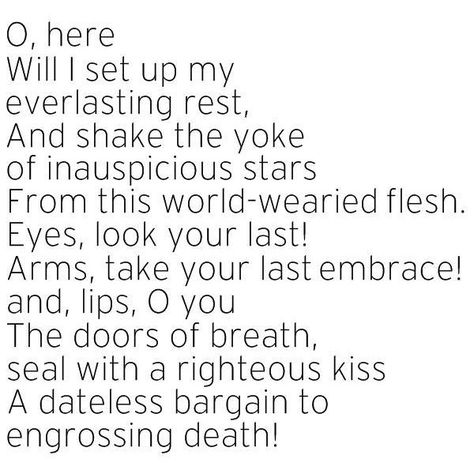

Viola and Shakespeare make their sad farewells, and Viola departs with Lord Wessex for the American colonies. The audience is taken through his thought processes, where he balances the pros and cons of ending his life an all time classic soliloquy. And drawing days out, that men stand upon. That we shall die we know 'tis but the time. Perhaps the most famous is Hamlet ’s ‘to be or not to be’ soliloquy, where Hamlet contemplates suicide. Seeing that death, a necessary end, Will come when it will come. For example, a very popular playwright/poet of the time, Nahum Tate rewrites the ending of King Lear and adapts it significantly to give it a happy ending. 04 of 10 Twelfth Night, 2:5 'Be not afraid of greatness. Mixed with the pain of separation is the anticipation of the sweetness of reunion. She also commands a message be delivered to Master Shakespeare to write a comedy for the upcoming Twelfth Night celebration. Shakespeare ’s plays feature many soliloquies, some of which are his most famous passages. 'Good night, good night Parting is such sweet sorrow.' These lines, spoken by Juliet at the end of the famous balcony scene, describe the mixed feelings of parting from a loved one. Elizabeth sends 'Thomas Kent' back into the theatre to fetch Lady Wessex (Viola). The undiscovered country from whose bourn no traveller returns. Hamlet’s soliloquy about the advantages of death Act 3 scene 1- links death to sleep very appealing, syballans whispering- lullaby, mellifluous quality, dreams or nightmares- this idea haunts him. "That woman is a WOMAN!" Queen Elizabeth, who is in attendance, intervenes and tells the magistrate he is mistaken it is obvious 'Thomas Kent' is not a woman although "the illusion is remarkable." Lord Wessex arrives looking for his runaway bride, and Elizabeth informs him he has lost his wager - that a play can show the truth and nature of love. To die, to sleep- to sleep, perchance to dream.

Just then the magistrate bursts in, accusing Shakespeare of breaking the law. As the play ends, the audience roars with approval. Think of this life but, for my single self, I had as lief not be as live to be. Overhearing that the performance is in trouble, she steps in as her alter ego, 'Tomas Kent,' and plays Juliet, and Shakespeare plays Romeo. Our life, exempt from public haunt, Finds tongues in trees, books in the running brooks, Sermons in stones, and good in everything. Immediately after her wedding to Lord Wessex, Viola bolts from the church and runs to the theatre to see the play. At the Romeo and Juliet premiere, the actor playing Juliet loses his voice, rendering him incapable of performing.


 0 kommentar(er)
0 kommentar(er)
